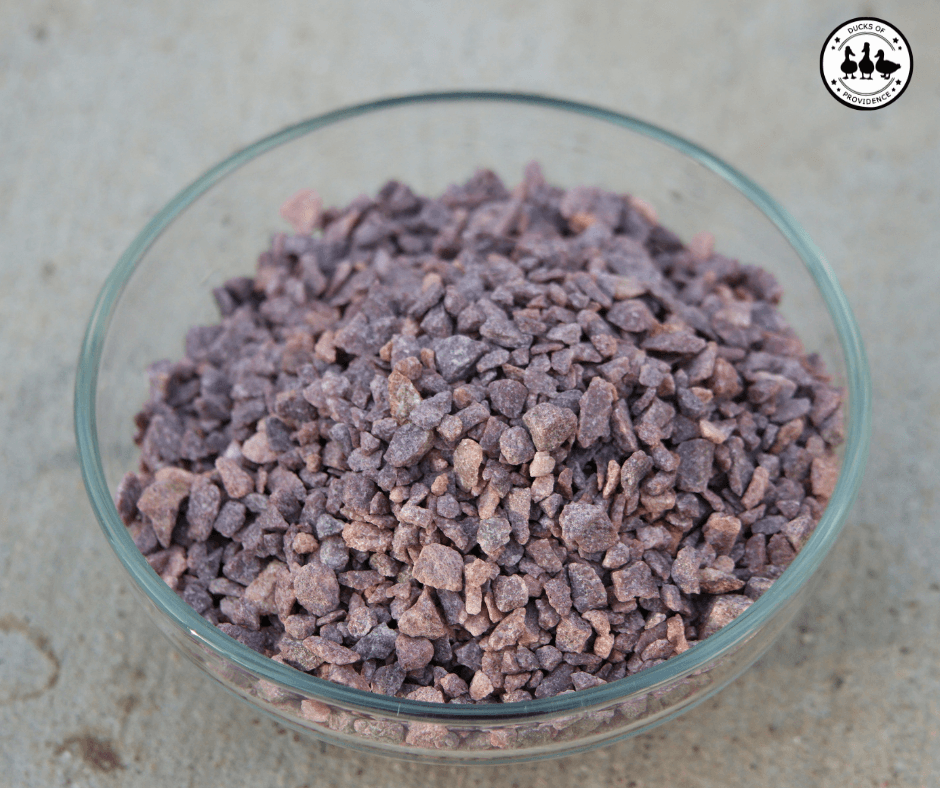
Grit for Ducks – Do they really need it? An Essential Guide
Last updated on January 15th, 2026 at 01:44 pm
When it comes to caring for ducks, one of the most common questions duck owners ask is whether ducks really need grit. The short answer is yes—grit for ducks is needed as an essential part of their digestive process. Unlike mammals, ducks do not have teeth to chew their food. Instead, they rely on their gizzard, a specialized muscular stomach, to grind up food with the help of small, hard particles like rocks or stones. This grinding process is crucial for proper digestion and nutrient absorption, supporting your ducks’ overall health and well-being.
While ducks that eat only commercial feed or have access to plenty of natural grit may not require extra supplementation, most ducks benefit from a consistent supply of grit. Understanding the different types of grit, when to provide it, and how it contributes to your ducks’ diet is key to keeping your flock happy and healthy. By providing grit, you’re taking a simple yet essential step to ensure your ducks enjoy a nutritious, comfortable life. Let’s take a closer look at why grit matters and how to incorporate it into your ducks’ diet.
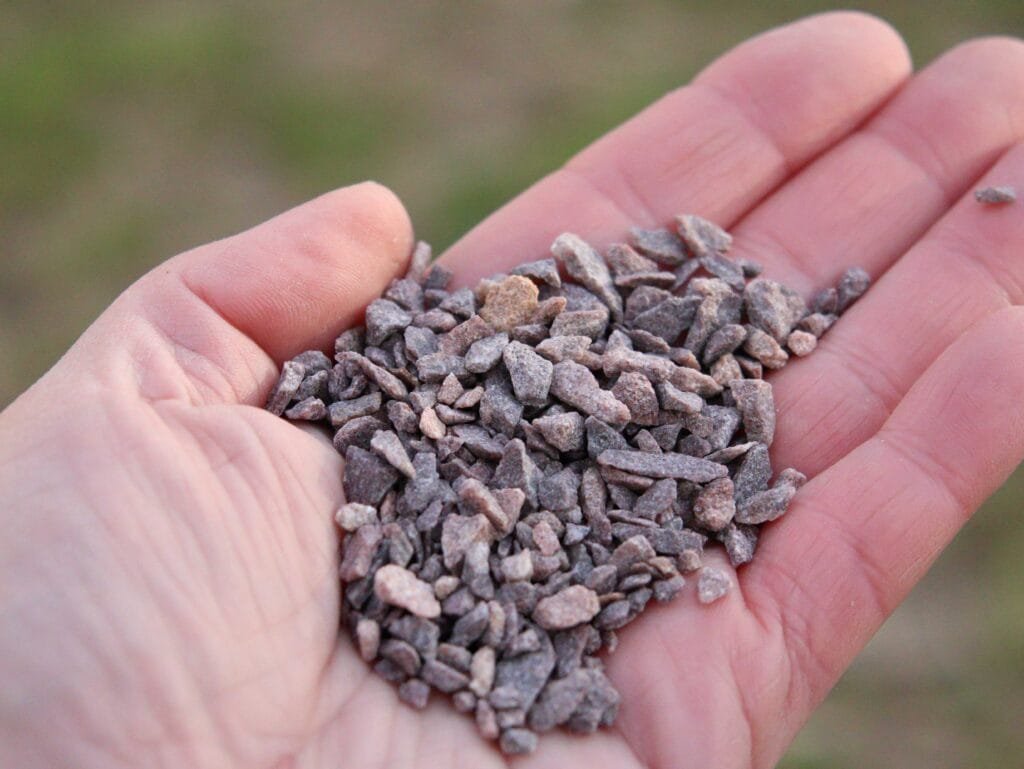
Disclaimer: I may earn a commission if you buy products or services through my affiliate links. This will not affect the price you pay. I only recommend products or services that I believe will be beneficial to my readers.
Why Ducks Need Grit
Ducks have a gizzard that functions as a natural grinder. Inside the gizzard, small stones or grit help break down food through motion and friction, acting like “teeth” for the bird. The gizzard is a powerful organ that contracts and grinds food into smaller, digestible pieces. Grit is especially important when ducks consume hard-to-digest foods such as:
- Seeds and Grains: Whole seeds and grains have tough outer shells that are difficult to break down without grit.
- Fibrous Plants: Grass, weeds, and other fibrous plant materials require grinding to release nutrients.
- Insects and Bugs: While softer than grains, some insects have hard exoskeletons that benefit from grinding.
- Other Non-Commercial Foods: Kitchen scraps (which you should avoid anyway), vegetables, and other treats often require additional processing in the gizzard.
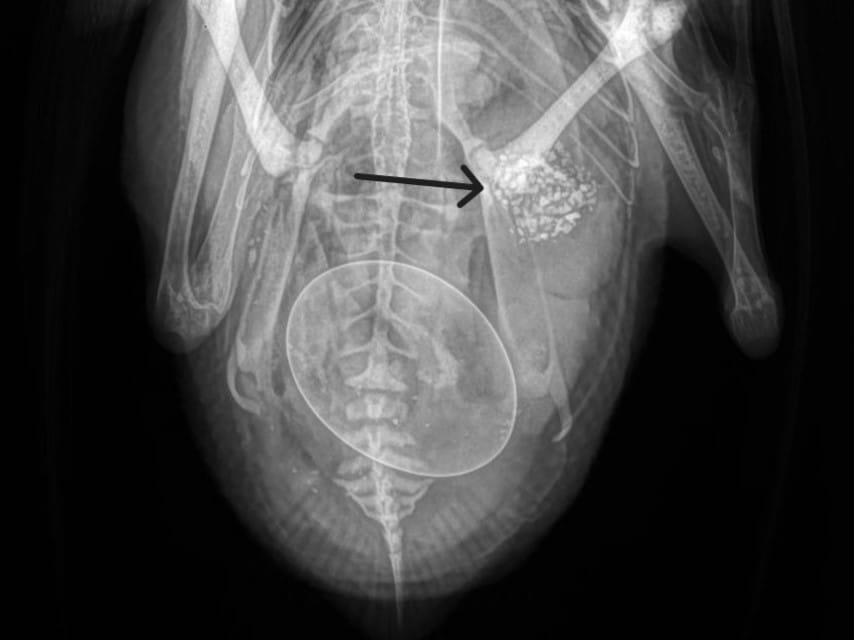
Without access to grit, these foods can pass through the digestive system partially undigested, leading to nutrient deficiencies and potential blockages. Over time, the lack of proper digestion can also cause stress on the digestive system, impacting overall health and growth. In essence, grit is a natural and vital tool that allows ducks to process a varied diet efficiently, ensuring they get the maximum nutritional benefit from their food.
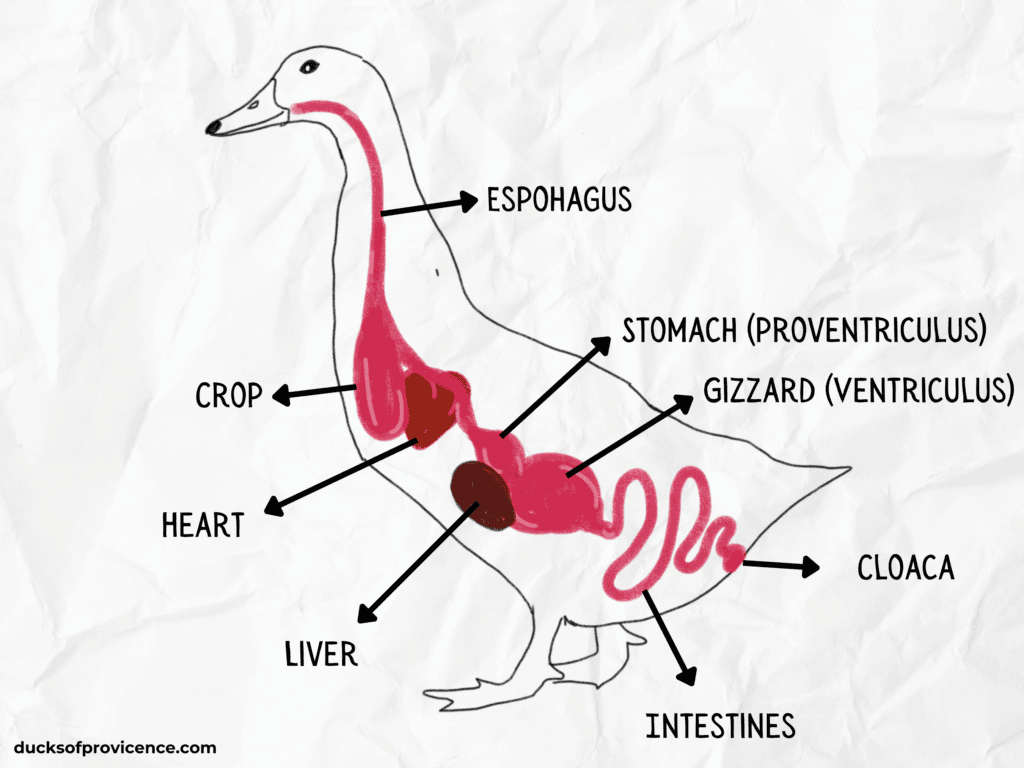
When Ducks Need Grit
Ducks require grit in several situations to support their digestive health, particularly when their diet or environment limits their access to natural sources. Here are the most common scenarios:
- Eating Whole Grains, Scratch, Bugs, Grass, or Vegetables: These types of food are not easily broken down without the grinding action provided by grit. Whole grains and scratch have tough outer coatings, while fibrous plants like grass or weeds require significant effort to process in the gizzard. Insects, especially those with hard exoskeletons, also benefit from being ground down with the help of grit.
- Living in a Confined Run: Ducks that are kept in enclosed areas without natural access to sand, gravel, or small stones will depend entirely on supplemental grit. This is particularly true for ducks in urban or suburban settings with scarce natural grit sources.
- Seasonal or Limited Free-Range Access: During winter or other times when ducks are confined to their coop or run, they might not have the opportunity to forage for natural grit. Similarly, ducks in regions with predominantly soft or sandy soils may not find the hard, durable stones needed for adequate digestion.
- Transitioning Diets: If you’re introducing new types of food, especially ones that are harder or more fibrous than their usual diet, providing grit ensures their gizzards can adjust and continue to function optimally.
By understanding these scenarios, duck keepers can anticipate when their flock might need additional grit and provide it accordingly to avoid digestive issues.
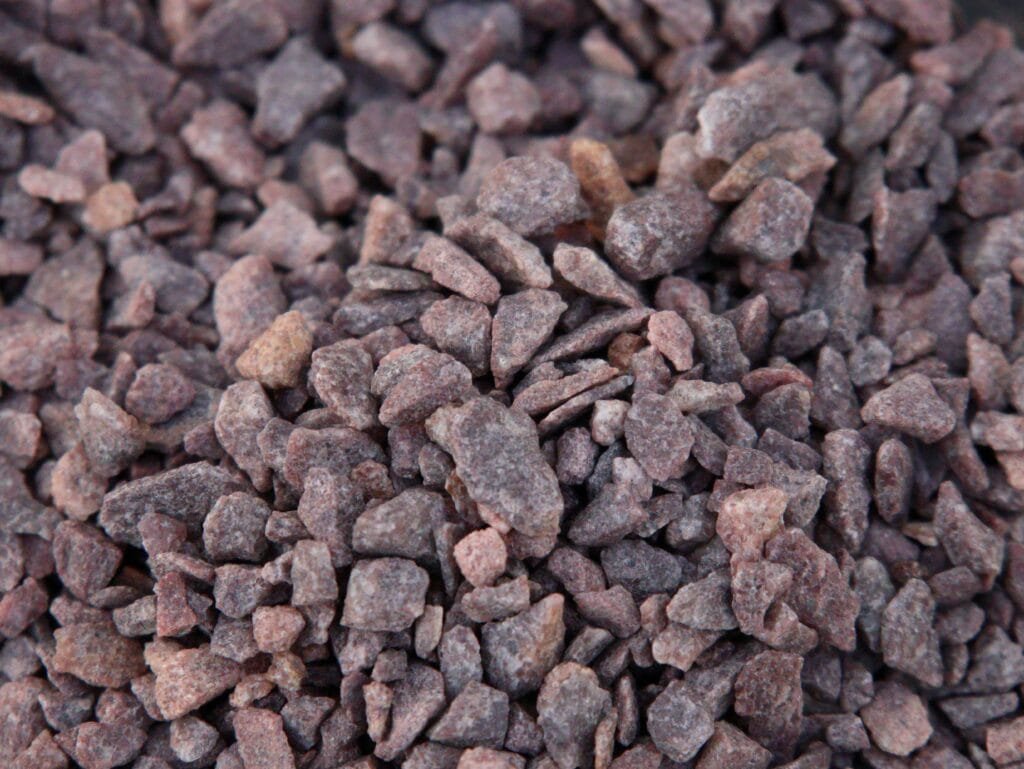
Exceptions to Grit Requirements for Ducks
While grit is essential for most ducks, there are specific circumstances where supplemental grit may not be necessary. These exceptions include:
1. Eating Exclusively Commercial Feed
Ducks consuming only commercial feed typically do not require grit. High-quality commercial feed is designed to dissolve easily in water and the digestive system, eliminating the need for grinding in the gizzard. This makes it an ideal choice for ducklings or ducks kept indoors without access to grit. However, grit becomes essential if you supplement their diet with whole grains, vegetables, or other treats.
2. Free-Ranging with Natural Grit Access
Ducks that free-range in environments rich in natural grit, such as areas with sandy soil, gravel paths, or rocky terrain, often meet their grit needs on their own. As they forage, they naturally consume small stones and particles, which their gizzards use for grinding food. In these cases, supplemental grit may not be necessary. However, duck keepers should monitor the environment to ensure an adequate supply of appropriate-sized grit particles.
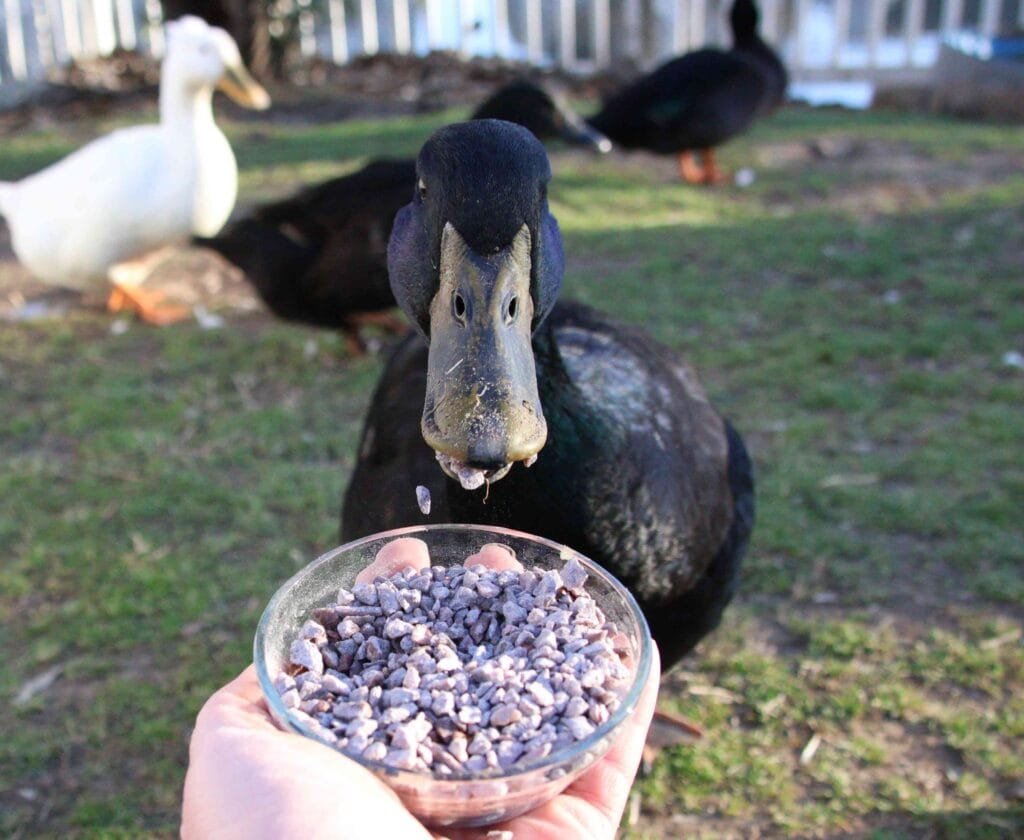
3. Specific Dietary Practices
Sometimes, ducks on specialized diets, such as those designed for health conditions or temporary feeding regimens (e.g., wet mash diets), may not require grit. These diets are often finely ground or pre-digested, reducing the need for gizzard processing.
4. Young Ducklings with Starter Feed
Ducklings raised on starter feed do not immediately require grit, as these feeds are formulated to dissolve quickly. If ducklings are introduced to treats like chopped greens or small bugs, they will need chick-sized grit (often labeled as “chick grit”) to help with digestion.
Monitoring Natural Grit Access
Even in situations where ducks have access to natural grit, keepers should periodically assess whether the environment continues to meet their needs. For example:
- Seasonal changes like snow or ice can limit access to natural grit in free-range environments.
- Certain terrains, like muddy or clay-rich areas, may lack the hard, durable stones required for grinding food effectively.
By recognizing these exceptions and providing supplemental grit when necessary, you can ensure that your ducks maintain proper digestion and overall health.
Types of Grit for Ducks
Ducks rely on grit to grind their food in the gizzard, and there are two main types of grit to consider when caring for your flock. Each type serves a distinct purpose and plays a unique role in supporting your ducks’ digestion and overall health.
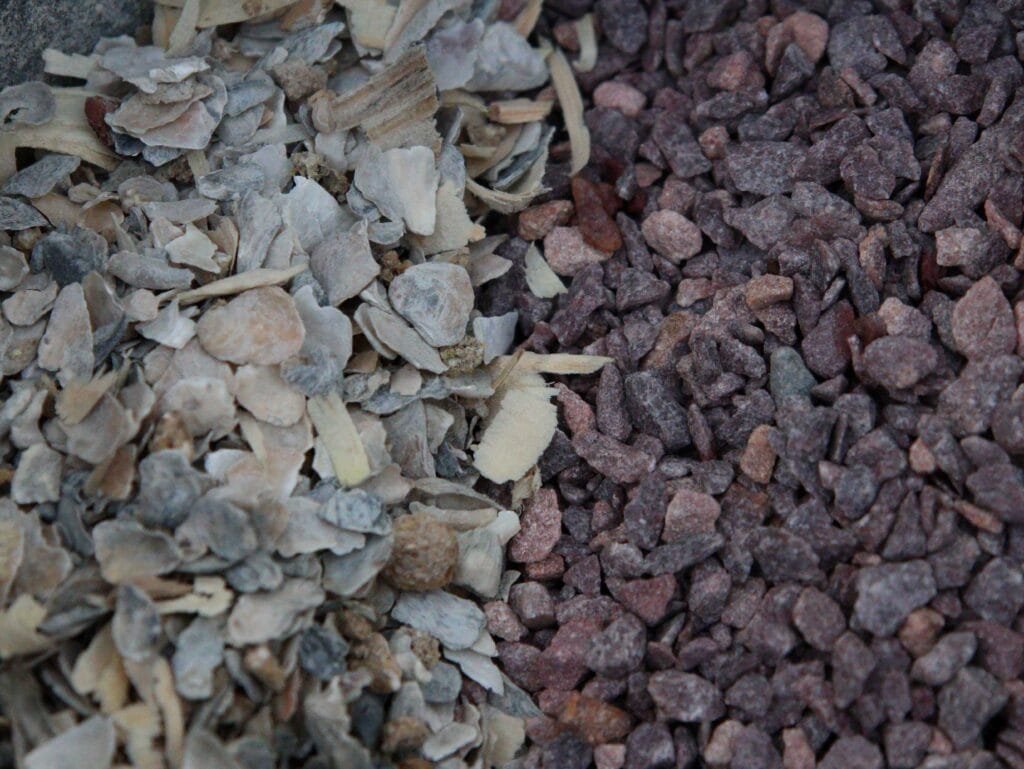
1. Insoluble Grit
Insoluble grit comprises hard, indigestible materials, such as granite or quartz. This type of grit remains in the gizzard, which helps break down food into smaller, more digestible pieces. Insoluble grit is essential for ducks consuming diets that include:
- Whole grains
- Seeds
- Grass and fibrous plants
- Bugs with hard exoskeletons
Key Features of Insoluble Grit:
- Durable Material: Made from hard stones like granite, which resist breaking down quickly in the gizzard.
- Size Specific: For adult ducks, the grit particles should be 3-6 millimeters (1/8 to 1/4 inch) in size. Ducklings require smaller grit, often labeled as “chick grit.”
- Longevity: Although it wears down over time, it lasts long enough to grind food effectively before needing to be replaced.
Insoluble grit is the most common type provided to ducks, as it directly aids in their ability to process a wide variety of foods.
✅ We love giving our ducks the high-quality grit from Grubbly Farms! As a proud brand ambassador, we trust their products to support our flock’s digestion and overall health. Their grit helps our ducks break down food properly, ensuring they get the most nutrition from their meals. Plus, we appreciate Grubbly Farms’ dedication to offering natural, wholesome options for backyard flocks.
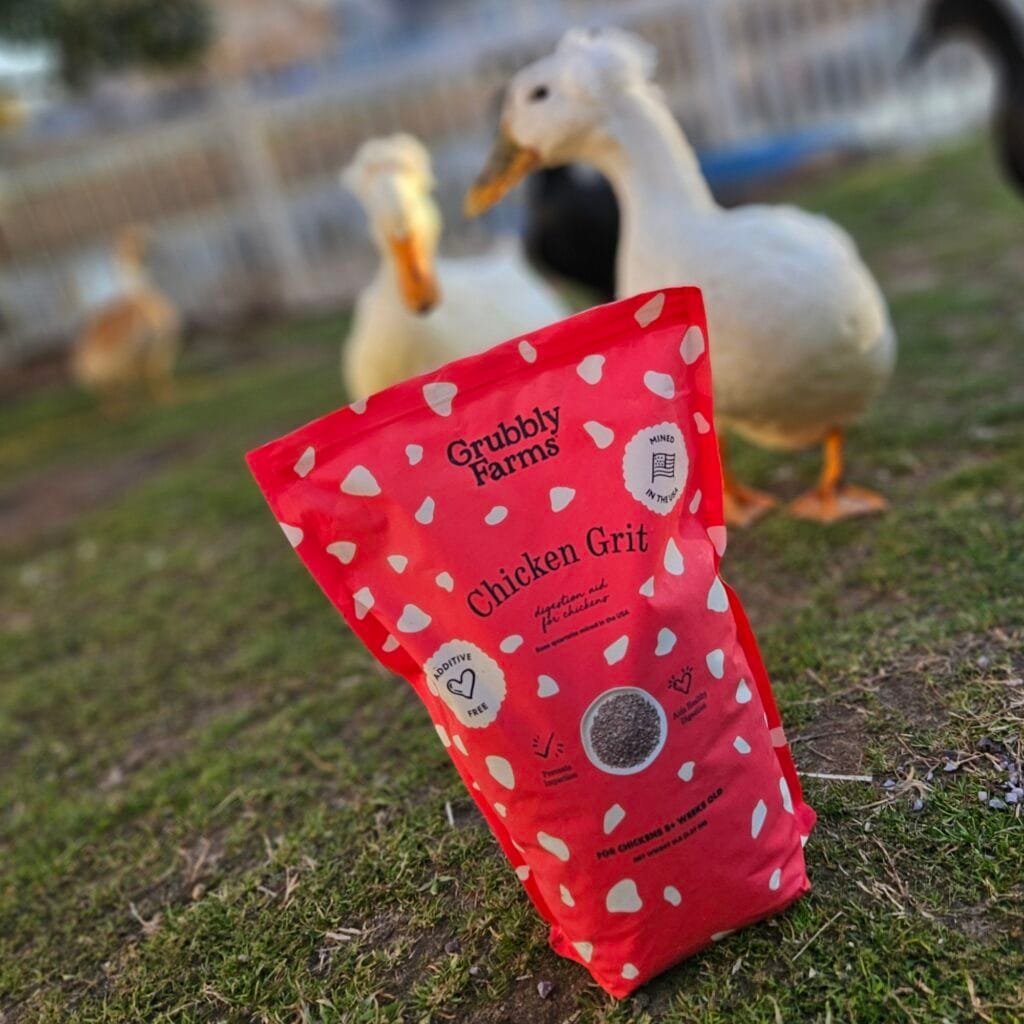
2. Soluble Grit
Soluble grit is composed of materials that dissolve in the digestive system, such as crushed oyster shells or limestone. Unlike insoluble grit, which stays in the gizzard, soluble grit breaks down and is absorbed by the duck’s body. The primary benefit of soluble grit is that it serves as a source of calcium, which is particularly important for laying ducks.
Key Features of Soluble Grit:
- Calcium Source: Helps maintain strong eggshells and overall bone health.
- Temporary Use: Dissolves and is absorbed by the digestive system, so it does not contribute to the grinding action in the gizzard.
- For Laying Ducks: Often provided alongside insoluble grit to meet the dietary needs of ducks actively laying eggs.
While soluble grit is not a replacement for insoluble grit, it is a valuable supplement for ensuring optimal health, especially in laying hens.
✅ Our ducks get their calcium boost from SolubleGrit: Crushed Oyster Shells by Scratch and Peck Feeds—our absolute favorite! 🦆💛 This essential supplement keeps our ducks’ eggshells strong and their bones healthy. If you’d like to try it for your flock, use PROVIDENCE15 at checkout to save 15% on your order!
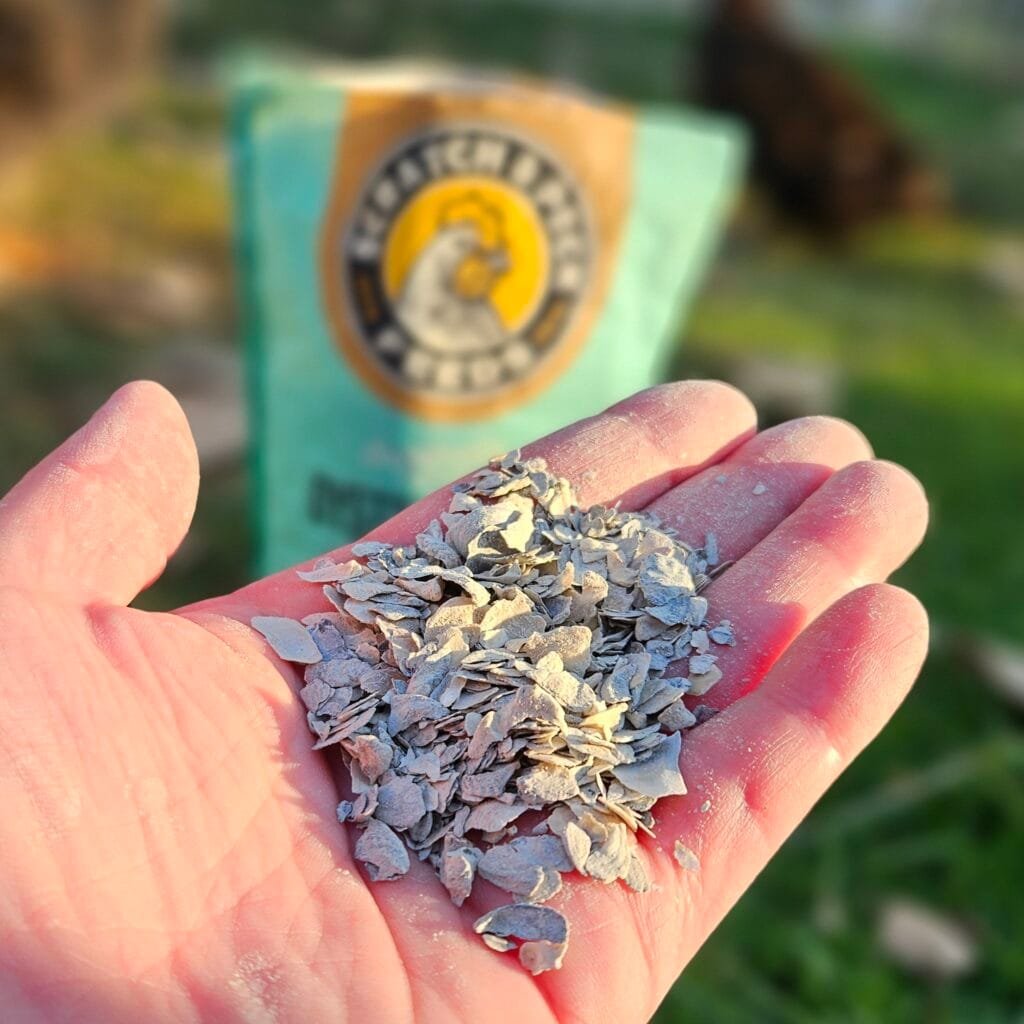
Choosing the Right Grit for Your Ducks
Understanding when to provide insoluble and soluble grit is essential for maintaining your ducks’ health:
- Insoluble Grit: Always provide this type of grit to ducks eating whole grains, fibrous plants, or other hard-to-digest foods. It’s a vital part of their diet unless they exclusively eat commercial feed or forage in areas with abundant natural grit.
- Soluble Grit: Offer this in addition to insoluble grit for laying ducks, as the calcium boost is crucial for producing strong eggshells.
You can support your ducks’ digestion, egg production, and overall well-being by providing both types of grit as needed.
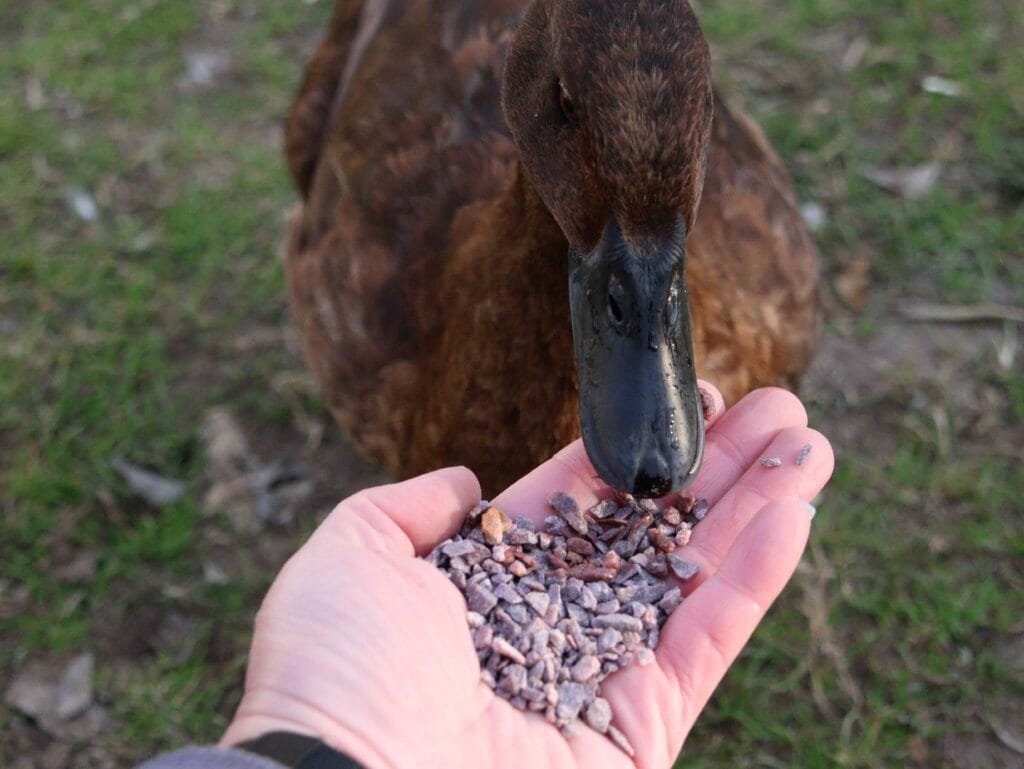
Grit Specifications for Ducks
To ensure your ducks are getting the proper grit, it’s essential to consider the following specifications:
- Particle Size: The size of grit particles should match the age and size of the duck. For adult ducks, grit particles should be 3-6 millimeters (1/8 to 1/4 inch) in diameter. Ducklings require smaller grit, often labeled as “chick grit.” Providing appropriately sized grit ensures it can be effectively used in the gizzard without causing discomfort or harm.
- Material: Crushed granite is the most commonly recommended material for insoluble grit. It is durable, effective, and readily available. Other hard stones can also work as long as they are clean and safe for poultry.
- Cleanliness: Always provide your ducks with clean, uncontaminated grit. Dirty or spoiled grit can introduce harmful bacteria or other pathogens into their digestive systems.
- Accessibility: Ducks should consistently have access to grit, especially if their diet includes hard-to-digest foods. Offering grit in a separate container allows ducks to consume the amount they need without wasting it.
- Replacement Frequency: Grit wears down over time due to the grinding action in the gizzard. To replenish what is lost, ensure ducks have a steady supply. Check grit containers regularly and refill them as needed to maintain availability.
Providing the correct type and size of grit tailored to your ducks’ age and dietary needs is critical for their digestive health and overall well-being.
How to Provide Grit for Ducks
The best way to ensure your ducks receive the grit they need is to offer it free-choice. This involves placing grit in a separate, easily accessible container within their run or enclosure. Here are some key tips for providing grit effectively:
- Location Matters: Place the container in a sheltered, easy-to-access area of the run. This ensures ducks can always find and use the grit, even in inclement weather.
- Choose a Durable Container: Use a sturdy, weather-resistant container that won’t tip over easily. Heavy-duty plastic or rubber containers are ideal for outdoor use.
- Keep It Clean and Dry: Regularly check the grit container to ensure the contents are clean and dry. Wet or soiled grit can harbor bacteria and may deter ducks from eating it.
- Separate from Feed: Offer grit in its own container rather than mixing it with feed. This allows ducks to consume grit as needed without affecting their food intake.
- Monitor Consumption: Observe your ducks to ensure they are consuming grit. If you notice undigested food in their droppings, it may indicate insufficient grit intake.
- Provide for All Ages: Use chick grit for ducklings and transition to larger particles as they grow. This ensures ducks of all ages can access the grit they need.
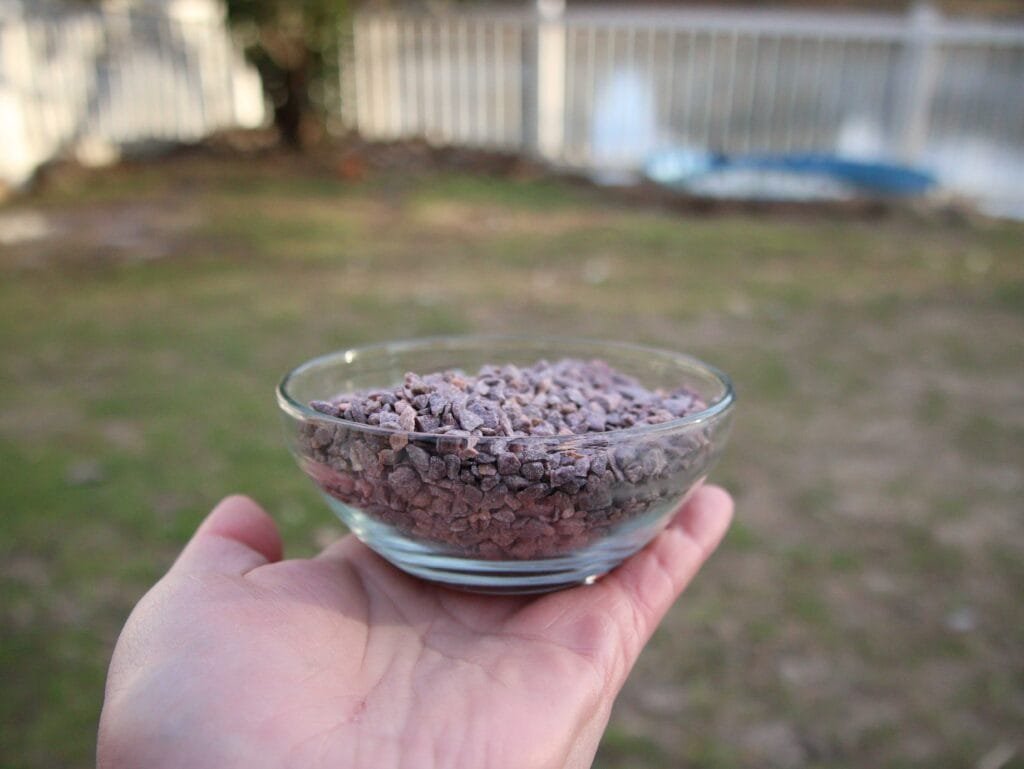
Pro Tips for Managing Grit
- Observe Droppings: If you’re unsure whether your ducks are consuming enough grit, observe their droppings. Undigested food in their waste may indicate insufficient grit intake.
- Rotate Grit Locations: If your ducks free-range part-time, consider placing grit in multiple areas to ensure they can find it regardless of where they are feeding.
- Check Seasonal Needs: Ducks may need more grit during times when their diet changes, such as during molting or when introducing new foods.
- Provide Separate Soluble Grit: For laying ducks, include a source of calcium-rich soluble grit, like crushed oyster shells, alongside insoluble grit to support eggshell production.
- Use Elevated Containers: If your ducks tend to scatter grit, try using a slightly elevated container to minimize waste and keep the grit clean.
- Introduce Grit Early: Start offering grit to ducklings as soon as they begin eating foods other than commercial starter feed. Use fine, chick-sized grit to suit their needs.
Final Thoughts on Grit for Ducks
To answer the question definitively: Yes, ducks absolutely need grit in most circumstances. Grit is essential to their digestive process, enabling their gizzard to break down food efficiently. This not only ensures optimal nutrient absorption but also supports their overall health and well-being.
While ducks that consume only commercial feed or have access to abundant natural grit may not need supplemental grit, the majority of ducks benefit from having a consistent supply. By understanding the types of grit, how and when to provide it, and its role in your ducks’ diet, you can ensure your flock remains happy, healthy, and thriving. Providing grit is a simple yet crucial step in responsible duck care, ensuring your feathered friends lead a comfortable and nutritious life.






